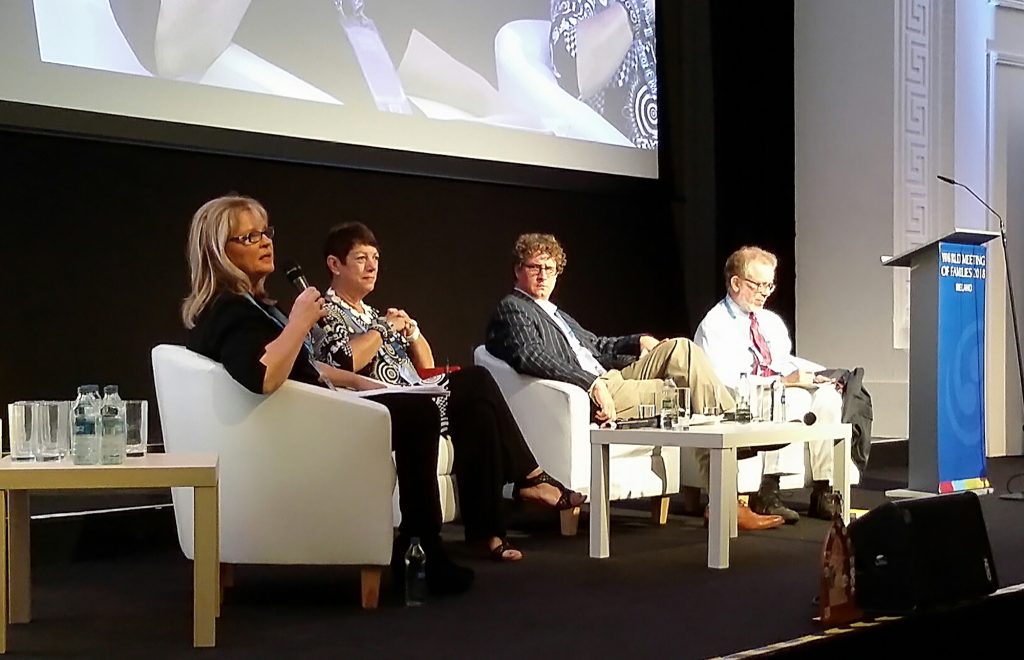Children have always faced the danger of exploitation and abuse in some form or another, but a panel at the Vatican-sponsored World Meeting of Families in Dublin on Wednesday warned that in a 21st century digital world those dangers have, to use the argot, gone viral.
One form they take, according to Irish laywoman Mary Aiken, an academic advisor for Europol, is the commodification of children on-line.
“Today, what’s growing is the danger of a commercial interest in children, who have their information collected and sold on the deep web,” she said.
Parents, she added, need not only to learn about child safety online, but actually engage their children to make sure they understand the risks.
Aiken was part of a panel titled “Dignity and Safety in a Digital Age: Facing new Challenges for Families.” The lineup also included Thomas Lickona, a developmental psychologist, his son, also an expert on the matter, as well as Teresa Kettelkamp, a member of the Vatican’s Pontifical Commission for the Protection of Minors and a former head of the U.S. Bishops’ Child Protection Office.
Aiken also said she’s “reluctant” to see children under the age of 14 having smartphones, because it not only opens them to the world of online grooming and abuse, but also gives the world access to their information.
In addition, she warned against the fact that people look at their phones an average of 200 times a day and touch them 2,500 times. That’s 200 times a day, she said, children miss making eye contact.
“This is terrible for human kind,” she said. “Effectively, children who’ve not made enough eye contact will later in life fail to bond and will struggle to form adult relationships.”
Forget the dolls, bring in the hard-core porn
“We can no longer count on the culture to back us up,” Lickona said. “Parents have to be more vigilant and intentional, we have to take deliberate steps to try to teach strong virtues that enable us to create a strong family culture that will help our children be protected at least in some measure against the dangers of the wider culture.”
The wider culture includes the global sexual revolution, he said, adding that it’s the dominant cultural revolution of the last half century: “It overthrows sexual morality, and as sex goes, so goes the family, and as the family goes, so goes society.”
The global sexual revolution, he argued, has normalized pornography, making its consumption a normal activity for men, and the internet made it ubiquitous.
Lickona, a father of two and grandfather to 15, showed a series of studies proving that in the United States and the United Kingdom boys begin consuming porn at the average age of 11, and by the year 2000, 65 percent of youth under 17 spent more time on adult porn sites than on gaming sites, and four in ten of them were girls.
He also said that in a study of the 50 most popular internet videos, female performers were abused physically or verbally an average of 12 times per scene. Gang rape and repeated anal sex with multiple men were frequently featured, and the female performers are always depicted enjoying the abuse.
According to a 2015 study from the American College of Pediatricians, children who consume porn under the age of 12 are more prone to be abusive with their peers, more prone to depression and anxiety, and more inclined to violence, sexual promiscuity and teen pregnancy.
Porn, the developmental psychologist said, “violates the dignity of the human person by treating people as sex objects; it’s addictive and can destroy marriages.”
What are parents to do?
Aiken acknowledged that behavioral sciences - much like the Catholic Church when it comes to tackling clerical sexual abuse - don’t always keep up with the changes on the threats against children.
“I don’t need a longitudinal study to tell me that nothing good will come from the harm being done to an 8-year old who consumes hard-core porn,” she said. “We need academics to work as first responders. We need to act now because children are being born and we need to take action to protect them.”
Likona suggested several resources for parents some of which are in fact addressed to youth and are designed to foster honest conversation between children and their parents, including the book Good Pictures, Bad Pictures by Kristen A. Jenson and Gail Poyner, as well as the website “Fight the New Drug.”
He argued that although everyone is constantly “playing catch-up” with technology, much can be achieved by making children less vulnerable through a strong family culture where open and frank conversations can take place.
“Family life has to be a priority, it cannot be displaced by smartphones,” he said.
The priority of family was the key element for all three speakers.
Kettlekamp, the papal adviser, said that talking to one’s children, developing a relationship with them and also “speaking with your own life,” has more “influence on your children than their friends, even if it might not seem so at the time.”

